Stories

Volume III in a series on local homelessness
from our own community members
Published
in conjunction with the Week of Action Against Poverty
February 14-20, 2010
Contributors include the volunteers, staff and clientele who make the Kenora Fellowship Centre a home for the homeless. All names have been changed to protect the privacy of those who have shared their deepest feelings, dreams and hopes.
INDEX:
Introduction
from the Patrons
from the Volunteers
from the Staff
Introduction
The Kenora Fellowship Centre offers shelter and comfort to the vulnerable, the disadvantaged and the displaced. It is the only operation giving refuge from the streets to marginalized citizens within the community and is strategically located in downtown Kenora. All are extended a warm welcome, a cup of tea or coffee, a snack, and often a warm meal.
The Fellowship Centre is abuzz each day with the ebb and flow of an average of 75 with many days well exceeding the 100. nbsp;Besides being poor, many of the regular visitors battle an addiction, have a mental illness and may also have a limited education and few job skills to equip them for employment in today’s economy. Some are homeless while others live in a small single room or share larger quarters with several others.
The Centre is their common meeting place, a place of camaraderie. Many regard as it as home, a secure place where there is assurance of personal worth and self confidence is rebuilt. The Centre is often the venue for communal gatherings including the birthdays, weddings and wakes of its clientele.

Much of the Centre’s operations are facilitated by the work of the approximately 50 volunteers who serve throughout the year. Some of those volunteering are former visitors themselves who have experienced difficulties coping with addictions and/or poverty. These volunteers can be found helping to serve beverages, meals, sweeping the floor or sitting down with others to do a jig-saw puzzle or play cribbage. It is this interaction between caring individuals and those beset by life’s merciless challenges that creates opportunities for growth and empowerment.
The centre is constantly adapting to the changing needs of our most disadvantaged citizens. Services have shifted over the years, but the core caring continues. At the centre of our operation are the values that pulse through its programs −respect, equity and compassion.
…from the Patrons
Letter 1
I moved to Kenora for the first time in many years and did not know about the Fellowship Centre. I didn’t know about it until I ran out of money and (had) no place to stay. I talked to someone I didn’t know and he told me about this place that would help me. So I was very nervous about coming to the Fellowship, but when I got here I talked (to) a lady named Doris and she said, “Come in,” and asked how she could help. So I told her where I came from and that I was out of money. She offered to help me get home, but I was here to look for work so she offered me a shower and a place to eat and sleep here in the Fellowship Centre. Later on, after some time had passed, she helped me with getting a place to live and helped with getting me social assistance here in Kenora. Soon after that, I found a job, but I still came to visit Doris, who sent me in the right direction for things (for which) I had need. I am very grateful for the things that the Fellowship Centre has done to help me and many others. They have helped me with food, clothing and a place to stay from time to time. It would be just terrible if this place were to ever close because so many people are in need of (a) place to come for help.
Letter 2
Boo
My name is xxxxxxx. I am not xxxxx - just (go by) my last name. For me I say, “Fellowship is a kind place.” The Director is a kind man and the staff. I remember I got sick and was sent far from home so the only way I could stay nearby was Fellowship.
I hope that Fellowship gets the help they need.
“Thank you, Henry and staff. I miss you Doris Horne.”
Letter 3
I started coming here at the Fellowship in 1990, when it was a day program. During the day Doris Horne and Rev. Hildebrandt gave out free clothing (and) fed you. If you were out of money for certain things, they would lend you their change if you promised to pay them back. Even then they would not expect it back. They gave and they gave out of their love for people and God. They have really helped me out the last few years. I truly thank the “Out of the Cold Program.” Without that program, a lot of people would be cold, without somewhere to sleep, with no showers, or washed clothes.
For myself I have used the Program effectively and to a manner which has kept me safe and sound.
Whenever they have Feasts and drumming, I am always there willing to lend a hand, and serve my elders and my friends.
I
thank you
Fellowship Centre
For your love and understanding
Yours
Truly
Your Friend
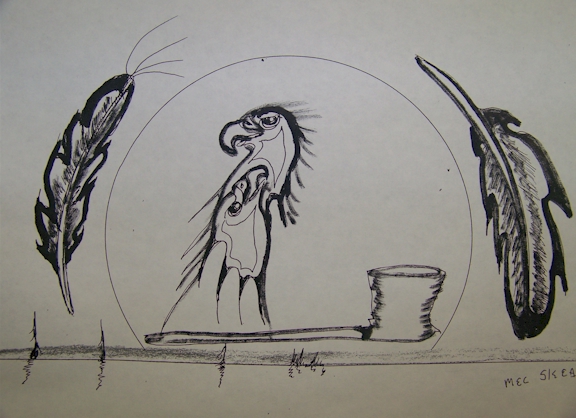
Letter 4
One day at the Fellowship Centre, I saw a band of “train-hopping” hippies come walking towards the door. My mother and I spotted them. A huge smile came across my face as I gazed at the instruments strapped to their makeshift patched backpacks. My mom wanted to take the dogs for a run behind her homemade pull shed, but I knew I could not pass up the opportunity to meet this band of merry men and women. We jammed a couple of songs as they watched the trains go by, eagerly awaiting their next departure. Staring out the big windows in the Fellowship that day I said to myself “Now what am I supposed to do? I have to rethink everything again! Oh well...”
So I thought about catching my first freight car. I wandered after the group, but they disappeared just in front of the hospital. My journey into the forest to find them was met with little success. As I walked down the tracks, I prayed, “What can I do. Please guide my footstep.” After a couple of deep breaths I was at my grandmother’s bedside, happy as ever and enjoying my time with granny.
Letter 5
This Centre was first opened in the 70’s. Doris Horne considered us as her children. She had a lot of respect for Natives and White(s). Best of all, staff have showed a lot of kindness and have helped people through “thick and thin.” They have fed a lot of people.
Letter 6
The thing about the Fellowship Centre is the workers that work here. They’re helpful. The names are Jebb, Dennis, Leonard, Rose, Bernice, Annette, Debbie, Rick. There are other workers here, but I don’t know their names.
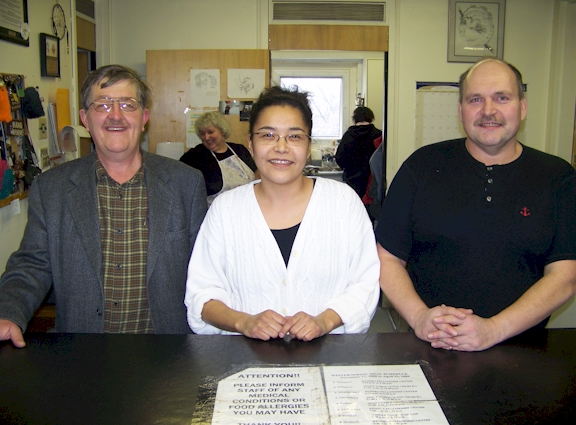
You just (tell them) what you need and they give (it to) you. Also, they take turns cooking and doing your laundry on their different shifts. They are grateful and helpful. You just have to agree and behave yourself, and listen and go by their rules.

The workers take turns cooking at 2:00 p.m. to feed the people and
the homeless street people.
When you ask for something, they give it to you if they
have it.
They) also give out food if they have it. Also for the ones that have no place to stay at nights they sleep here. But you can’t be under the influence. (I’m) glad there is a Fellowship.
Letter 7
The first time I heard about Fellowship was through a friend - an elder friend - where to get coffee and tea. A good place out of rain and snow in winter. Now I did forget my friend’s name. I was in my teens, fourteen, and shy at first but with no cash. (I) grew to know (the Fellowship Centre) as a good place. Been here since, throughout the years. I enjoy the workers. They (are a) very excellent group. (Their) job is to keep (the Fellowship Centre) clean, very well kept. At times, when I make it home to Grassy Narrows, I miss the place and friends. Can’t be MIA too long.
Thank you for the friendship.
Your friend
Frank
My dad used to come here and I learned from him to come here for help. I’m disabled and lived on the streets in Kenora for about two years. When I needed food or clean clothes or a safe place to sleep, I would come to the shelter.
Once I met my wife, I got off the streets and got a home. We even got married here by the minister. We’re both disabled and still come here for help. The staff are friendly, and I try not to get on their nerves too much. Sometimes I joke in the wrong way, but they are teaching me not to bug people.
Once a year, they pay half of our tickets to Thunder Bay. We go to see our son. He’s in care because the doctor gave orders about it so he couldn’t live with us. Our son is 9 years old. I would like to see him more often, but we can’t. At least the Fellowship Centre helps us to see him once a year.
One time the Centre made a Christmas play. I was Joseph, and my wife was Mary. We wore costumes and had to remember our lines. We had to practice a lot. My family and friends came to watch. I was sweating nervous, but it sure felt good when everybody clapped.
It also feels good when my people came to drum. Once they did a healing song for me. It really mattered to me that the Fellowship Centre cares about our ways.
Joe
This is a place where people come to feel good, and they leave here feeling better.
Carl
I can remember when they had a daycare here and I would come as a child. I’m 41, and I’m still coming here. It’s my second home. Doris became my second mother. This is an important place to me, and I try to help like they help me. I am an Anicinaabe (Anishinaabe) traditional dancer and drummer. I live on a disability pension, and sometimes a powwow happens when I don’t have the money to attend and share my gifts. The Fellowship Centre loans me the money, and I pay them back when I get my cheque. It matters that they respect the ways of my people.
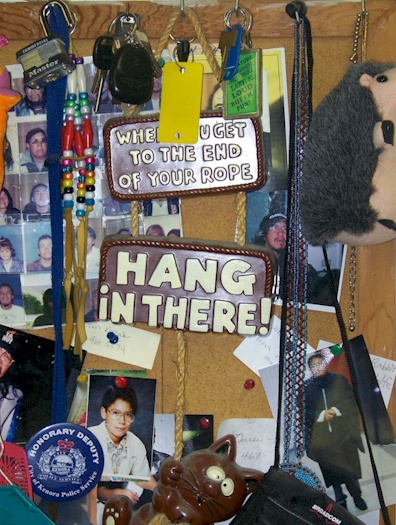
Tom
Without this place I wouldn’t be where I am today. I’m disabled and they helped me when I needed it. Because of my pension rules, it would have taken three months to get a place of my own.

The Fellowship Centre gave me enough money to pay down rent when a place came up, and it is hard to get places in this town. They helped me, and that’s why I volunteer here so often. I can help out, too, and that makes it better for everyone. I may be too disabled to work,but I can still be useful to others.
Norma
A long time ago, I was drinking and Doris got me into Clarissa Manor. It was a hard journey, but now I don’t drink. I try to help those who are still on the streets because I remember how it was. This place helped me make a better life. It was a struggle, and I did often fall, but I got up again. Today it’s not so bad. I’m glad for the Fellowship Centre, but I need a place to live, not just a room without even a hotplate of my own. What’s next for me?
Sara
My grandmother was in the hospital in Winnipeg. She had to leave our home in North Spirit Lake to have the surgery, and I was worried. I found a way to get to Winnipeg with my two children to be with her. After our visit I got as far back as Kenora. I had enough money for a hotel and intended to take a connecting bus to Red Lake. I found out that the bus didn’t make that connection. I was stranded alone with two small children until the next bus run.
I was really scared. A man from the Fellowship Centre found me. I knew him from high school so I trusted him to help me. He arranged for me to stay during the day at the Youth Drop-In Centre. A lady from Street Patrol helped me get to a hotel for the night, and the next day I went to the parent’s program at the Nechee Friendship Centre. I don’t know what I would have done without that help. My children and I were kept safe, and I was able to make arrangements to get home to my dad. I never expected to be in the situation that I was, but help was there when I needed it. I would like to thank all of those who helped me on my way.
Bill
This place is a prison of kindness. They are pretty good to me, but I don’t have choices. A man needs choices in his life. I’m glad the Kenora Fellowship Centre is here, but I want a place of my own. I am 64 years old and am disabled. The hospital released me, and the only place my worker found for me to live is a second floor apartment in a building full of drunks. I’ve done my share of drinking, but I’m too old for this kind of craziness. I’m in a wheelchair right now, and I will still need a walker once my feet heal up. How can I get up a flight of stairs? I don’t know what I am going to do.
Sometimes it feels like the white man is still keeping us down by giving us things but not freedom. I get food, clothes and shelter−sometimes it’s the drunk tank and sometimes at the hostel but never a place on my own, never enough money to buy the food that I want or never given a way to make a living. Our old ways are gone, and there doesn’t seem to be a new way to take care of ourselves. There’s just street life, and that is not a life for anyone.

…from the Volunteers
Volunteer 1
I’ve worked as a staff here before. It was a training program, but there is no money for hiring or expanding programming. I care about these people - that’s why I help out when I can, but they need so much more. Keeping people alive isn’t enough. We can’t just feed them, clothe them, and shelter them. We need to offer options for life beyond basic needs−life skills, job training that leads to real jobs, places that they can afford to live. It frustrates me that there is little to offer beyond surviving. If all the agencies and politicians would just put their resources together and commit to making a difference, we could do it. I complain, and then I turn around and volunteer to help someone here yet again.
Volunteer 2
I was barbequing for one of Making Kenora Home’s street picnics at the Fellowship Centre. I had just handed off the last of the burgers when this big fellow ambled into the lot. I’m fairly large myself, but he seemed to have almost a foot on me. He came up to the barbeque grill that I was cleaning and asked for his burger. It was a toss up as to whether I felt worse because of the lack of food or of this giant’s reaction to the lack of food. Drawing a deep breath, I looked him in the eye (craning my neck up to reach his eye) and informed him that the food was gone. He took a step towards me. I was caught between the big guy and the barbeque. Suddenly he made his move. I was pulled into a tight bear hug. As I gasped for air, he released me. Patting my back he soothed me with “It’s alright. Don’t feel bad.” Of course I felt even worse then. If I was hungry and missed the meal, I don’t think that I would be comforting the cook.
Volunteer 3
I was helping with the Christmas Sharing Circle. Because music is so important to celebrating, we had two guitarists who had volunteered to play for a seasonal sing-a-long. Asking for requests, a woman slowly rose from her corner where she had been nodding off. She was battered. Her face was bruised, and the jacket had fresh blood splatter across the front. She had a reputation for being tough, and from her knuckles, it looked like she had got a few shots in also.
Having risen, she requested “O Holy Night.” It was an unexpected choice. We were thinking along the simpler lines of tunes like “We Wish You a Merry Christmas.” Her choice was a difficult one to sing because of the range required and few knew all of the words. Respecting her request, our guitarist began strumming. The woman began singing. Each word was clear. Each note was perfect. The beauty of her song silenced everyone around, including the musicians. She continued a capella, never hesitating, never stumbling. The song soared, and if your eyes were closed, it was a cathedral worthy rendition. The end came sharply. Still no one spoke. The woman looked around the room, giggled and said simply, “My dad used to make us go to church and this was his favourite.” I’ve never forgotten the unexpected beauty of her song in that moment. I heard that she returned home after that.
Volunteer 4
There’s this guy. He’s a big guy−almost hulk like. Every morning, he’s here. Lots of people are here regularly, but the unusual thing is what he’s here for. He waits every day for our opening because he wants to brush his teeth. He is absolutely passionate about it. He keeps his toothbrush here to protect it from loss on the streets. He is so pleased when that toothbrush is handed over and he speeds to the washroom with great enthusiasm. He can be cold, wet and hungry, but brushing his teeth comes first. His pleasure in life to have freshly brushed teeth. Everything else can be falling down in on him, but if his teeth have been cleaned, he faces it all with cheerfulness.

Volunteer 5
At one of the street picnics held at the Fellowship Centre, a young mother attended with her toddler. I watched the very social young girl wander through the picnickers, basking in all the attention given to her. Several of the Centre’s clientele seemed to be resisting her attempts to engage them in play. I wondered why they also hadn’t fallen under her charm. Finally one of the fellows asked permission to speak to her. I was puzzled until he had explained. He said that people were often afraid to let children near them. “It’s as if we are animals that will hurt them.” Later the same gentleman motioned me over. He pulled a plastic baggie out of his pocket and carefully smoothed it out so I could look at it. It was a battered snapshot of a child-obviously worn by handling. He smiled shyly and announced that this was his grandchild. After hearing my appropriate admiration of the child, he shook his head sadly. He had not seen her for a long time, and he hurt over the loss of her. Deliberately, he folded up the plastic wrap and replaced the prized photo back into his pocket. Unfortunately his loss was not so easily put away.

Volunteer 6
It was Christmas. The elder who was directing the celebration was insistent that Japanese oranges and candy canes be distributed during the party. She explained that because this is what was given out at residential school. Puzzled, we asked why she would want a reminder. She said that not all memories of school would be bad and this would have meaning. We accepted her explanation, brought in the supply of oranges and candy canes and waited for understanding of the importance of these treats.

After the distribution of greetings, gifts and treats, I looked around the room and noticed an elderly man sitting in a corner. Because he was alone, I watched to see if he needed anything. His gift lay untouched beside him, and he held something that seemed to hold all of his attention. I shifted for a better view. It was the mandarin orange and the candy cane. He lifted up the candy cane and smiled. It was a slow and wistful smile that reflected private, pleasurable memories. He nodded his head and slipped the candy into his pocket. Next he took the orange into his hands and raised it to his face. He sniffed and again, that same smile spread across his features. Lowering the orange, he began to peel it, stopping to sniff it as he progressed. All the activity of the celebration swirled around him, but he had no awareness of anything other than the peeling of that orange. Finally he finished. He examined the peeled fruit yet again, sniffing and smiling. Then he began eating it, one segment at a time−satisfaction suffusing his whole being. I motioned over the elder. She glanced in the gentleman’s direction and gave her own quick smile acknowledging the scene. “He’s tasting his childhood.”
Then I understood the importance of the treats.
Volunteer 7
He was an old guy who had seen hard years. He leaned into a corner of the room, avoiding contact. A special pancake breakfast was being held to celebrate Valentine’s Day. There were pink tablecloths and flowers laid out on the serving counter. It wasn’t meant to be an ordinary day, and he was obviously suspicious of the whole change in routine. While others smiled at the decorations and exchanged twitters of jokes and teasing about the romantic possibilities of the day, he held back. He had eaten standing up, hunched over his plate and quickly devouring the feast.

After he lay the plate aside, he continued leaning in the corner. It was too cold to go outside so he bore the frivolousness around him.
In the midst of cleanup, a choral group arrived to surprise one of the volunteers. His wife had arranged for a song to be sung just for him as a special Valentine’s gift. The singers launched into their love song. In the corner the old guy straightened up, listening intently to the music. As the singers launched into an encore, tears slipped down the leathered face.
Concerned, I went over to check on the gentleman. I touched his arm and he turned to me, “I’d forgotten” he said, “I’d forgotten about love.” He drew his sleeve across his face to wipe off the wetness of his tears. Lowering his arm, he continued, “The last time I remember Valentine’s Day I was a kid. It was so long ago.” The wrinkled face split into a toothless grin. “Thank you for helping me to remember.”
…from the Staff
Staff 1
The Fellowship Centre is a meeting place. People come and go. Sometimes they are travellers whose rides have failed. Sometimes the police bring in people who can’t get back to their homes on winter nights. Sometimes people come in from the far north to attend court or get medical attention, and then they are released hundreds of miles from home without a way to return. Sometimes they are people who are just stuck in life. I worry about what would happen to all of these people if the Centre wasn’t here. What would happen to all of these people?
It is amazing how much talent comes through here. The art and music flows through the place. Everyone shares what they know, and we all grow. It is good to be in a place where nationality doesn’t matter and we care about each other. I like working here. It’s about being able to show the best parts of being human − caring, compassion and kindness. We don’t often get a chance to live this in the workplace.

The sad part about this work is that the needs are greater than what we can provide. We need to expand the program. The shelter is only part-time, but the need is full-time.
Staff 2
Our longest resident was Franklin. He was a mud turtle who came into our care for several years. He was big old turtle who grew and grew. Finally he was housed in a big aquarium. He was everyone’s pet. One day Franklin was gone. We all looked and looked for him. Some thought that he needed to be free and that he was better off in the wild. Some thought that he was too old and tame to survive outside the shelter. The debate raged on for a long time. It was distressful for everyone. He was loved and is still talked about and occasionally looked for. Sometimes someone will think that they have spotted him by the shoreline or the docks or on the creek banks. He certainly lives on in memory.
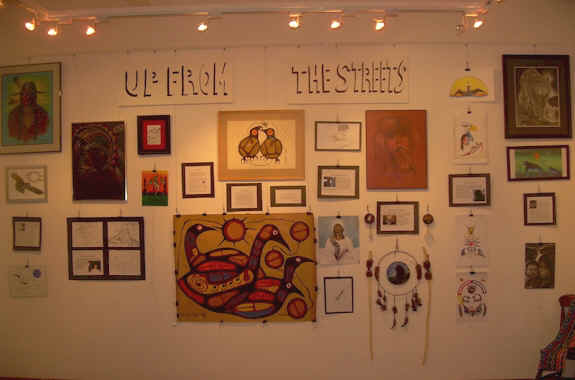
Staff 3
One of the joys of being a minister is being able to preside over marriages. I get to do that at the shelter and they are special events. One of the weddings that comes to my mind was the marriage of two of our regular patrons. No one had expected either one of them to find love in their lifetimes−each faced too many challenges just to survive. On that day the bride was shyly glowing in her traditional white gown. The groom was boisterously proud in his suit. The finery was used, but the chapel was decorated, and friends and family came to attend the unexpected wedding. The music was real, the soloist was in fine voice and everyone celebrated this couple. They still are regulars here and are still sweetly committed together and against the odds.

Staff 4
After the fuss of Christmas, many of our patrons feel the blues, so we started having a get together to celebrate the New Year coming. It became an annual event. This year our neighbours from St. Alban’s joined us in the celebration. It was a festive coming together of peoples from very different walks of life. It was so good to see our patrons sharing a good time with those that they generally don’t interact with in daily life. Sometimes the conversations took place between seemingly incongruous combinations but that is what made it all so wonderful to watch. We are finally beginning to talk and walk together as human beings should.
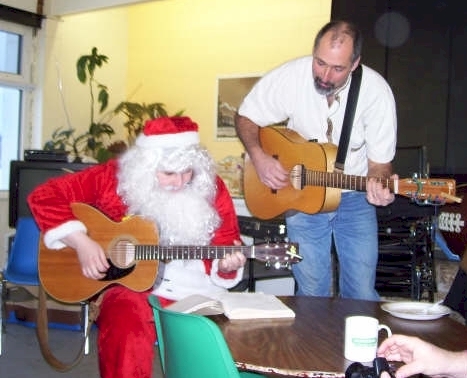
Staff 5
The nicknames are funny. Everyone seems to get one sooner or later−patrons, staff, volunteers. We have Howard the Duck, Big Bird, Chocolate Bar, Alabama, the Muppets. It’s about being equals. Everyday there is something funny that happens. The jokes are sometimes bleak, but the teasing always goes on and on. The humour is what saves all of us from tough times.
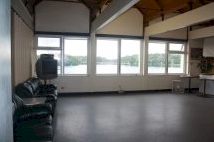
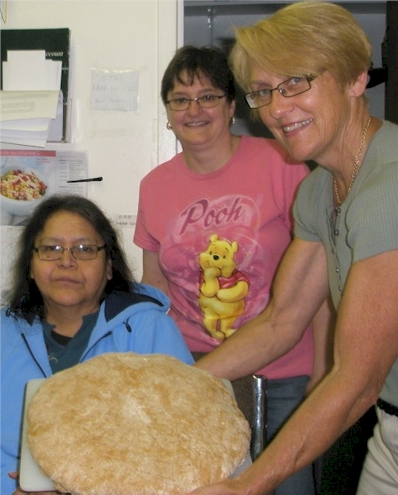
For more information on Making Kenora HOME, please visit our website: www.makingkenorahome.ca
The written permission of Making Kenora HOME is needed before reproducing any portion of this booklet.
Published February 11, 2010
“As long as you live, there is Hope”

Published with the assistance of Kenora Patricia Child & Family Services during
Week of Action Against Poverty
February
14 -20, 2010
